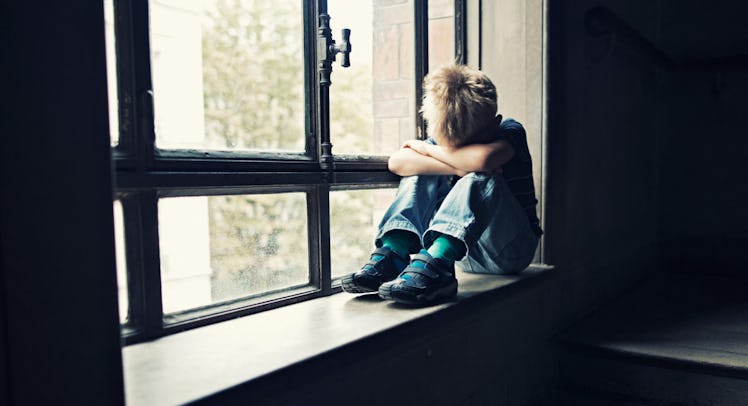Yes, It’s Totally Possible To Gaslight A Kid
Fortunately, it's fairly hard to do by accident.

The suddenly ubiquitous and frequently misused term “gaslighting” comes from the 1938 play, and later film, Gas Light, which follows a husband who manipulates elements of his wife’s reality, slowly driving her insane. Specifically, it refers to him slowly turning down the lights while denying doing so, forcing her to question her own perception of the world by subtly adjust norms. Over the last few decades, the term has been used mostly to describe men dismissing women and politicians attempting to question the premises of fact-based policies. The popularity of the term stems from the hard truth behind it: Anyone can be convinced that they’re crazy.
That is doubly true when that anyone happens to be a child.
According to Dr. George Simon, psychologist and author who specializes in manipulation, gaslighting is a complicated form of emotional abuse can occur in platonic, professional, and familial relationships. Parents do it. It’s just sometimes harder to notice because kids often occupy fantasies. But there is a different between dissuading a child of something false or fiction and persuading a child to believe something untrue.
“It’s not gaslighting if the kid is being appropriately corrected for their fanciful or their distorted take on reality,” says Simon, adding that convincing kids to believe in Santa and the Tooth Fairy isn’t technically gaslighting either. “Those are tactics of manipulation and control. But they’re relatively benign.”
What isn’t benign is covert aggression. When a person suffers from a character disturbance or personality disorder, they may be tempted to manipulate others for their gain. When this is done so that the child can’t figure out what’s going on, the kid is being gaslit. This can be a particularly powerful experience for the child because its unlikely that they’ll have developed the self-assurance to question remain confident in their outlook despite the objections of others. This means that they can quickly be taught not to trust themselves. Over time and depending on how bad the emotional abuse is, this can make it nearly impossible for a them to get a grasp on reality.
Generally speaking, the people who gaslight children are generally deeply insecure or narcissistic. In both cases, the adult is motivated by a desire to have a child think of them in a very specific way. This tends to result in certain patterns of misrepresentation and mistruth. “It’s kind of like the emperor’s new clothes,” says Simon, “the narcissist doesn’t like to be exposed.”
Should people who don’t crave the approval of a child be concerned that they might gaslight one anyway? Not really. It’s very difficult to gaslight a person, at least in a textbook sense, by accident because intent is at the core of the transgression. Still, Simon is quick to add that it’s quite possible to create a “gaslighting effect” without realizing it. Trying to get a child to see the world through the eyes of another by, for instance, being dismissive of their imaginary friend, can be harmful or confusing. But that’s not abuse; it’s a nearly inevitable product of hanging out with a tiny person that doesn’t have a strong grip on reality.
A father of two, Simon is open about the fact that he worried about accidentally gaslighting his kids when they were growing up. What he didn’t worry about was his intention, which was to raise happy people. Over time, he made peace with the idea that it was that intention that mattered.
“They knew the love was there and had a certain innate confidence that whatever was coming their way, was not designed to demean them,” he say. “It was all about their welfare.”
That’s not called gaslighting; that’s called parenting. It’s also a crazy-making thing, but in a very different way.
This article was originally published on